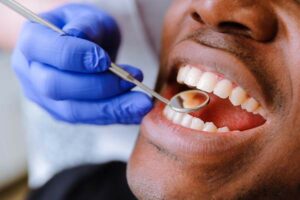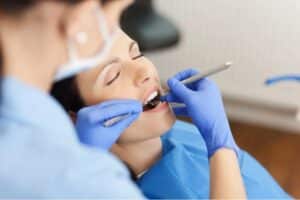Bruxism is a condition more common than what most think. With a faster-moving society, it is common to experience high levels of stress and tension. Bruxism is only a physiological reaction to these factors. It consists of unconsciously clenching, grinding, or rubbing teeth as the jaw moves either from side to side or back and forth. This is especially common while the person sleeps, which makes it even harder to control. Untreated, bruxism can have important repercussions on teeth because it destroys the tooth enamel and causes severe wear and fractures.
Just like any other muscle, the constant clenching and moving of the jaw causes excessive exercise on related muscles and a bite stronger than normal. This is a gradual but continual process so the person is not aware their jaw muscles are stronger than usual, but even if the tooth enamel is more resistant and flexible than any other material, it suffers wear and trauma. This causes shorter, more sensitive, loose, or fractured teeth. The trauma also causes lesions, called abfractions, and bone loss. Prolonged clenching also puts considerable pressure on the muscles and tissues related to the jaw, which can lead to stiffness, clicking of the joints, headaches, and soreness. However, there are some patients who present no symptoms apart from the gradual wear on teeth.
Neurologists and dentists alike have been unable to determine the exact cause for bruxism as these vary considerably. It is mostly related to stress, anxiety, anger, and concentration. It can also be a result of an abnormal bite or spasms of facial muscles during sleep. Since its cause is still a mystery, it has no cure. At best, professionals can palliate the effects by relieving the symptoms. Daytime bruxism can improve by increased awareness and the practice of stress-relieving activities like exercise and physical therapy. Sleep bruxism can be treated by dealing with the stress-causing situations, avoiding work-related items near bedtime, and maintaining a soothing bedtime routine.
At the Costa Rica Dental Team, we very frequently see adult patients who suffer from some aspect of this condition. To these patients we always recommend to wear a night guard to protect their teeth. If the wear is advanced, we recommend crowns as a restorative option. Cases like these merit the use of zirconium over porcelain, because of its resistance to wear and fracture. Since wear starts at the occlusal and incisal surfaces of most teeth, patients with advanced bruxism will be recommended a full mouth restoration, in which an ideal bite can be designed to palliate its effects.
If you believe you are suffering from bruxism or if you´d like to restore the damage caused over the years, do not hesitate to contact us. We are experts in this kind of restorations. You´ll see your teeth will look like new.




